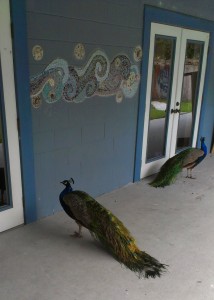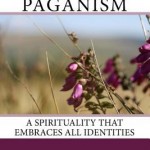 I spent last weekend at the Florida School of Massage, where I communed with their peacocks, soaked up the sun, and learned a new bodywork modality from one of my favorite bodywork writers, Deane Juhan. Deane is equally delightful in person as in text, if not more so. In fact, I wrote down a number of his sayings in my notes word for word. (My favorite, on the nature of having a body: “Our birthright is ecstasy, not freedom from pain.”)
I spent last weekend at the Florida School of Massage, where I communed with their peacocks, soaked up the sun, and learned a new bodywork modality from one of my favorite bodywork writers, Deane Juhan. Deane is equally delightful in person as in text, if not more so. In fact, I wrote down a number of his sayings in my notes word for word. (My favorite, on the nature of having a body: “Our birthright is ecstasy, not freedom from pain.”)
I was aware that, like me, Deane had a background in the academic study of religion and literature, but I didn’t know the full extent of our parallels until I heard his story last weekend. Deane and I both made the choice to become bodyworkers around our first Saturn return, at age 28. He had been studying the poetry of William Blake at UC Berkeley, and was about a year from finishing his dissertation. (William Blake is an amazing eighteenth- and nineteenth-century mystic, artist, and poet of the flesh. His rejection of the standard Western mind/body dichotomy has a lot to offer Pagans. In fact, here at Patheos, I see Aidan Kelly has been writing about Blake just this week!)
On Deane’s birthday, a friend took him to Esalen in Big Sur. It was the 1970s, and Esalen was in its heyday as a center for the human potential movement, bodywork, and alternative spirituality. As Deane tells it, he received professional-level bodywork for the first time while in the bathhouses, looking out at the ocean: a beautiful experience that put him fully in his body. When it came time to leave, he got into his car to go, but one of the people in charge stopped him. Another employee had just quit; did Deane want a job? He thought, “I can go home and write about this kind of experience, or I can stay here and live it.” So he put his car keys away, and the rest is history.
So what does any of this have to do with Pagan theology?
My Pagan theology begins with the body. All of my experiences, even ones like dreams or trance journeys that appear to separate me from my body, cannot become part of me unless I experience them with my senses and process them with my squishy, wet brain. So long as we are human, we are our bodies, and our consciousness is both of a manifestation of that body and fully integrated with it. We do not think with our brains alone; we think with our whole nervous system. We do not love with our hearts, but with the totality of our flesh.
That which we think of as “spirit” is fully a part of that bodily system. In my witchcraft tradition, we often speak of human beings as having three souls. Each of these “souls” has a different function and makes up part of the human being. But some (myself included) prefer to speak of these souls as “subtle bodies”—integral parts of the human self whose essence is the same as the physical body, but which we cannot so easily see or touch. So when I say that body and spirit are one, I don’t deny that there is more to the world than can be perceived by our physical senses. Rather, I want to emphasize that our bodies are us, and that what we think of as the soul is not separate.
Bodyworkers know this on a visceral level. Many of us come to bodywork as a spiritual calling, because we’ve experienced what it means to lay hands on another person in a conscious way. When you touch another’s flesh, it’s not just skin, blood, and bone that you’re contacting: it’s that person’s entire history, all the experiences ever had by that perceiving body. People bind emotions into their bodies that are sometimes stirred up or released through bodywork. Sometimes our clients cry on the table; sometimes they see visions, or laugh hysterically, or remember something they’d long forgotten. There is nothing like working with hundreds of people’s bodies in an attentive way to convince a person that the body and mind are absolutely one.

In his most famous book, Job’s Body, Deane Juhan argues that the body is the vehicle of all our experiences. We relate to everything that is through our bodies, including—and perhaps especially—the divine. Yet many of our bodies are trapped in habitual or even painful physical and emotional patterns: restricted breathing, frozen muscles, collapsed posture, all often relating to depression, anxiety, or trauma. Some of us suffer constantly with chronic pain that doctors can’t satisfactorily diagnose or treat.
Deane suggests that if we are able to teach our bodies new patterns of movement, breaking up the old, chronic patterns of dysfunction, we can do more than simply lessen pain. Rather, we may be able to expand our ability to sense, experience, and perceive with our bodies—in effect, to expand consciousness and open ourselves to the possibility of divine ecstasy. For Deane, and for me, full engagement with the body is the direct path to deepening relationship with self, divinity, and the world.
Obviously, the path toward health and then toward joy is not always an easy one. At age thirty-four, I’ve had my share of health struggles, and I’ve spent years being frustrated with the treatment available to me. Although bodywork is hardly a cure-all, it’s helped me facilitate my own healing. Perhaps more importantly, though, engagement with my body has become a cornerstone of my spiritual practice. The human body, with all its amazing complexity, is the temple where I worship. For me, knowing the body is a path to the Gods.
Most theologies begin with considering the nature of divinity, with the nature of humanity as a secondary concern. I like the idea that my Pagan theology should begin with the human, with the very flesh I’m using to write these words. For if we come to know our own flesh, I believe, in the same moment we will also perceive the divine.
















